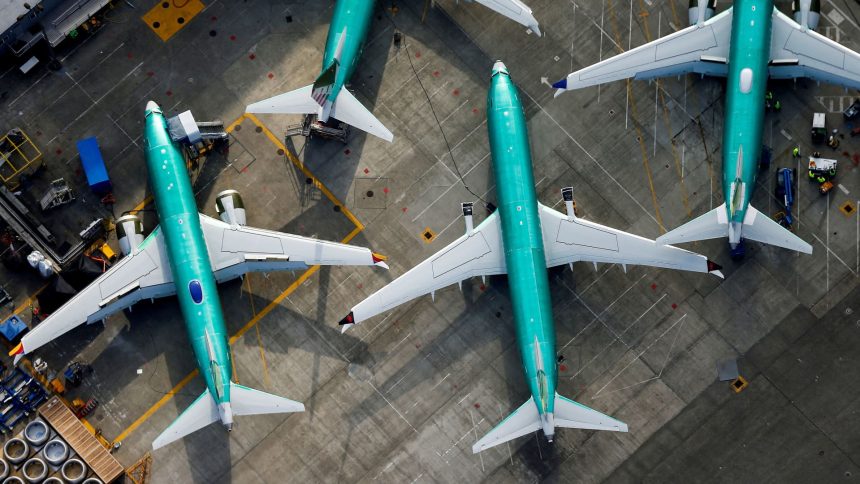Boeing on Wednesday reported a better-than-expected quarter but continued to burn cash as it tries to stabilize production following a near-catastrophic door blowout on a 737 Max earlier this year.
Boeing burned $3.9 billion in the first quarter, beating a previous company forecast and Wall Street analysts’ expectations for cash burn of as much as $4.5 billion for the three-month period.
“Near term, yes, we are in a tough moment,” CEO Dave Calhoun, who announced in March that he would step down by year-end, said in a note to employees on Wednesday. “Lower deliveries can be difficult for our customers and for our financials. But safety and quality must and will come above all else. We are absolutely committed to doing everything we can to make certain our regulators, customers, employees, and the flying public are 100 percent confident in Boeing.”
Boeing has been hamstrung in ramping up production, especially of its best-selling 737 Max planes, and instead has lowered output. After the door plug blew out on the Alaska Airlines Max 9 on Jan. 5, the Federal Aviation Administration has barred Boeing from increasing output. The FAA also said it found numerous issues of noncompliance along Boeing’s supply chain and on Feb. 28, gave Boeing 90 days to come up with a quality control improvement plan.
Calhoun reiterated Wednesday that the company’s 737 Max production has dropped below 38 Max jets per month. Deliveries have slowed sharply this quarter.
Boeing’s all-important commercial airplane unit revenue dropped 31% to $4.65 billion in the quarter compared with last year, with negative margins widening to 24.6% from 9.2%.
“We are using this period, as difficult as it is, to deliberately slow the system, stabilize the supply chain, fortify our factory operations and position Boeing to deliver with the predictability and quality our customers demand for the long term,” Calhoun said. “As these efforts begin to take hold, we’re seeing early signs of more predictable, stable and efficient cycle times in our 737 factory, and expect this will continue to slowly improve.”
Boeing lost $355 million in the first quarter, or 56 cents a share, down from a $425 million, or 69 cent per-share, loss a year earlier. Excluding one-time items, including pension costs, Boeing lost $388 million, or $1.13 a share.
Revenue fell 8% to $16.57 million, slightly ahead of analysts’ estimates.
Here’s what the company reported compared with what Wall Street analysts surveyed by LSEG were expecting:
- Loss per share: $1.13 adjusted, vs. estimated adjusted loss $1.76
- Revenue: $16.57 billion, vs. estimated $16.23 billion
Calhoun on Wednesday stood by the company’s goal of $10 billion in annual free cash flow in the 2025-2026 period, but said hitting that target would likely be delayed by about six months.
“I believe it, I just do,” Calhoun said of the $10 billion goal.
Boeing has been scrambling to reduce what is known as “traveled work,” when manufacturing steps occur out of order because of defects. Calhoun told CNBC in an interview on Wednesday that the company’s fuselage maker Spirit AeroSystems will “only ship a conforming fuselage.”
Boeing has been in talks to buy back Spirit, which it spun off almost 20 years ago. The Wichita, Kansas-based company also supplies Airbus, and conversations around how to address non-Boeing customers are key to an acquisition deal.
Calhoun said it is “more than likely” that the companies reach a deal during the second quarter.
“Spirit, in working with its other customers, is taking actions to ensure that all of those relationships are what they need to be,” he told CNBC. “We’re going to be patient and let them get their job done with their respective customers and we’ll get a deal done.”
Boeing executives will hold a call with analysts at 10:30 a.m. ET, and questions abound for Boeing’s lame duck CEO Calhoun and other company leaders.
Among those questions: When will Boeing stabilize its production line and increase production of the 737 Max and other planes? When will Boeing appoint a new CEO? How much will the current crisis cost Boeing?
— CNBC’s Phil Lebeau contributed to this report.
Read the full article here




